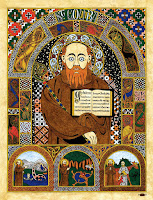I'm getting some kind of birthday present related to "The Scottish Play" ... and that's all I know about it. My sister said I needed to familiarize myself with said play but, as it turns out, I have previously done a deepish dive into Duncan I An t-Ilgarach of Scotland (or Alba), the king killed by the titular protagonist of the play. Why?
Well, my family are connected to/descended from Clan Robertson on the side of my maternal grandmother. The Robertsons are the main branch of Clan Donnachaidh. "Donnachaidh" means "sons of Donncha" ("dark-skinned warrior" ... literally "brown-battle"/donn-cath).
Here's where it gets interesting. The English form of "Donnchad" is "Duncan" as in the king from The Scottish Play and refers to said king as the progenitor of the clan. King Duncan's father was Crínán of Dunkeld, the abbot of the Monastery of St. Columba in Dunkeld. St. Columba, by the way, was exiled to Scotland (wink, wink) after fighting a battle over a Psalter he copied.
Quick note about the Psalter because I just love this story. According to legend, there was a Psalter owned by St. Finnian of Moville which St. Columba copied at night by a light shining from his own hand. The copy was discovered and, in one of the earliest copyright cases, King Diarmait Mac Cerbhaill gave the judgment, "To every cow belongs her calf, therefore to every book belongs its copy." St. Columba didn't like that and decided to take it back by force, leading to the Battle of Cúl Dreimhne. Many men died and, as a result, St. Columba was forbidden from ever walking on Irish soil again and told to save a soul for each one whose death he caused.
The Psalter was ever after called the "Cathach" or "Battler" which, while etymologically related to "Donncha," doesn't really have anything else to do with the name. It remains the oldest surviving manuscript in Ireland. A holy man of the Irish would wear it around his neck and walk three times deasil (sunwise/clockwise) around the Irish warriors before battle. The opposite way is "widdershins" or "withershins" and ain't that the coolest sounding word ever‽‽‽ It's apparently normal for Orthodox Christians and Jews to go widdershins in their liturgical movements and I think that's why I could never be either. I'm not tryna end up in Álfheimr (Elfland/Fairyland).
Another quick note about Álfheimr. In the Grímnismál, it is said that the gods gave Álfheimr to Freya as a tooth-gift. A tooth-gift is a gift given to a child when they cut their first tooth. I feel like that should be reinstituted merely so that we can start saying "tooth-gift" again. The Old Norse word for "tooth-gift" is tannfé and gave rise to a newer word, or usage of the word, tannfe or "tooth-fairy." Amazing! I can't remember where I first heard the following, but it fits:
Kid's putting their teeth under their pillows is the most occultish shit in the world. Yes, child, put the discarded bone under your pillow! If you are lucky, the tiny demon will come and make her purchase. Sell your bones for riches, my child. Your youth will be spent soon.
Terry Pratchett would agree. (You should DEFINITELY read, or watch, "Hogfather" and make it a new X-mas tradition.)
I think I've gotten off track. This was supposed to be about me. Anyway, St. Columba's feastday is June 9th which is my birthday. By the by, "Columba" isn't Irish or Scottish. It's Latin for "dove" from the Greek κόλυμβος meaning, apparently, "I dive"? Because doves dive? Anyway, his original name, Crimthann, is Irish for "fox." He took the name "Columba" when he was baptized possibly at the point of his exile as a reference to "Jonah" (יוֹנָה) which also means "dove," a reference to the both of them as reluctant missionaries. Love it!
Yet another quick note about St. Columba. Again, according to St. Adamnan, he scared off the Loch Ness Monster with the sign of the Cross. And when King Brude/Bridei I of the Picts locked the gates of Urquhart castle against the saint, Columba sang down the gates in true D&D bard fashion. I CAST VICIOUS HYMNODY!!! Speaking of bards, I recall hearing that St. Columba ruled in defense of the bardic order, but I can't find evidence of that.
Sooooooo, to summarize, for my birthday, I'm going to do something relating to the play about the man who killed King Duncan I of Scotland who gave his name to Clan Donnachiadh, the Sons of Duncan, which became Clan Robertson which was the clan of my maternal grandmother. And King Duncan's father was the abbot of a monastery in Dunkeld whose patron saint, Columba's, feastday is my birthday which is the day (I guess?) I'm going to do ... the thing. Whatever the thing is.



Comments
Post a Comment